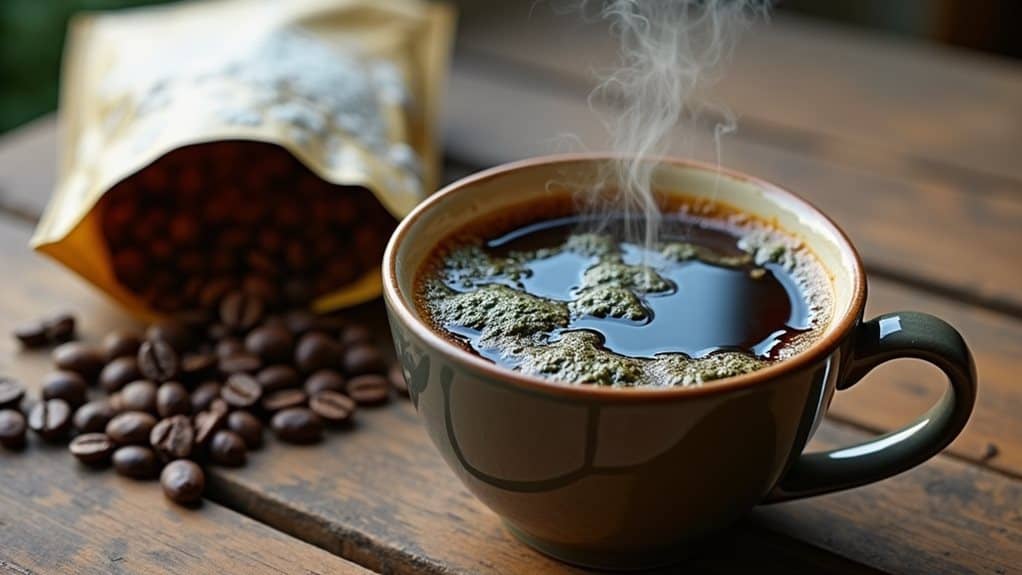You won't get sick from drinking expired coffee if it's been stored properly, but you'll notice significant changes in taste and quality. The coffee's bold flavors will diminish, replaced by papery or woody notes and a hollow, sometimes sour taste. Specialty coffee beans particularly lose their complex sweetness and fruity elements after about a year. While toxicity isn't a concern, watch for signs of spoilage like mold or unusual textures. Proper storage in airtight containers, away from heat and light, can help maintain your coffee's quality longer. Understanding proper storage methods and shelf life factors can dramatically improve your coffee experience.
Quick Guide
- Drinking expired coffee is generally safe when properly stored, with the main concern being diminished quality rather than health risks.
- Flavor deteriorates noticeably, shifting from vibrant notes to papery, woody tastes with a hollow, sometimes sharp flavor profile.
- No significant health hazards exist unless mold or unusual texture changes are present, which indicate spoilage.
- Storage conditions greatly impact coffee quality, with proper temperature and airtight containers helping maintain freshness longer.
- Quality changes are most noticeable within 6-12 months, particularly in specialty coffee beans with complex flavor profiles.
The Safety Behind Expired Coffee

While many people worry about drinking expired coffee, you'll be relieved to know it's generally safe to consume.
Your coffee won't become toxic over time, and if it's been properly stored in an airtight container away from heat and light, you can still drink it safely.
The main concern isn't safety but rather quality, as long as there aren't any signs of spoilage. Look out for warning signs like mold or texture changes that indicate your coffee has truly gone bad.
Changes in Taste and Aroma
Time takes its toll on coffee's intricate flavor profile.
When your coffee expires, you'll notice it loses its lively acidity and sweetness, replaced by papery, woody notes.
The fruity, citrus elements and floral intricacies disappear, leaving a hollow taste.
You'll likely detect a sharp, sour flavor that's characteristic of stale coffee, and the aromatic compounds that make coffee smell wonderful will have dissipated.
Specialty Ethiopian coffees are particularly susceptible, with brews older than one year showing a loss of complex sweetness.
Understanding Coffee Shelf Life

Coffee shelf life depends on several critical factors that work together to determine how long your beans or grounds will maintain their peak flavor.
Oxygen exposure is the main culprit behind coffee degradation, with a 10% increase in oxygen causing a 10% faster decline in quality.
Temperature, moisture, and light also play significant roles, while your coffee's roast level affects its longevity. Proper storage in hermetic barrier packaging can significantly extend coffee's freshness by protecting against environmental factors.
How Storage Affects Quality
Proper storage can make or break your coffee's quality over time.
You'll want to keep your green coffee beans at temperatures between 15°C to 20°C (59°F to 68°F) and maintain relative humidity between 50% to 60%.
Even under these ideal conditions, you'll notice quality changes within 6-12 months for specialty beans, as chemical reactions and moisture loss affect flavor and aroma.
Best Practices for Coffee Consumption

Getting the most out of your daily coffee routine boils down to understanding key consumption guidelines.
You'll want to limit your intake to 400 mg of caffeine per day, roughly 4-5 cups.
Drink your coffee with food to prevent stomach issues, and time your consumption wisely by having your first cup an hour after waking.
Stay hydrated by drinking water alongside your coffee. Additionally, be mindful of the safety concerns with dairy to reduce health risks when consuming coffee with milk or cream.
Wrapping Up
While drinking expired coffee won't make you sick, you're not getting the best experience from your beans. Your coffee's quality declines over time, affecting taste and aroma. To enjoy your coffee at its peak, you'll want to store it properly in an airtight container away from heat, light, and moisture. By following proper storage methods and consuming your coffee within its recommended timeframe, you'll guarantee the best possible cup every time.

